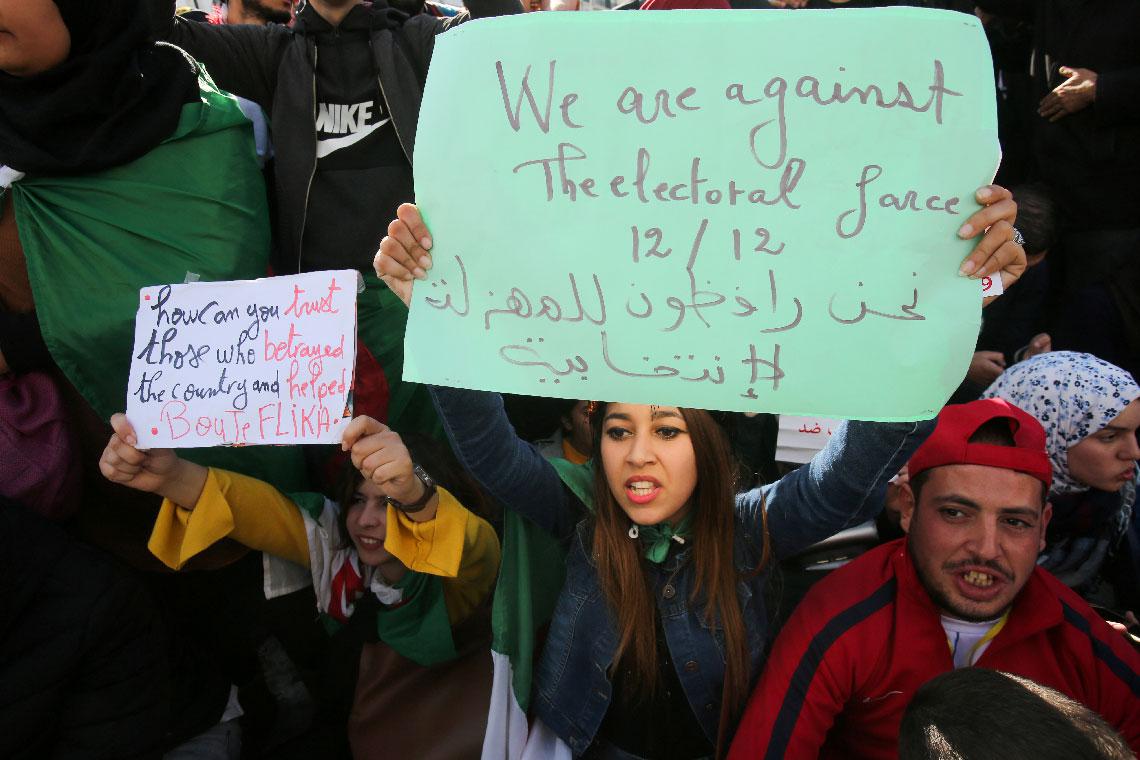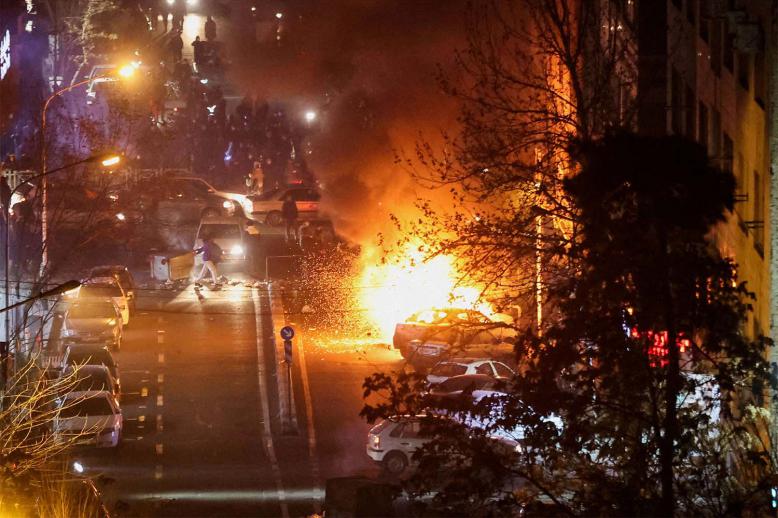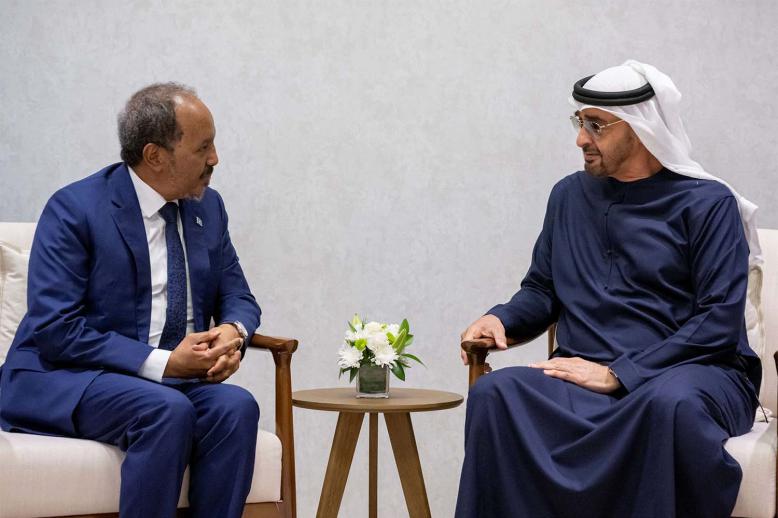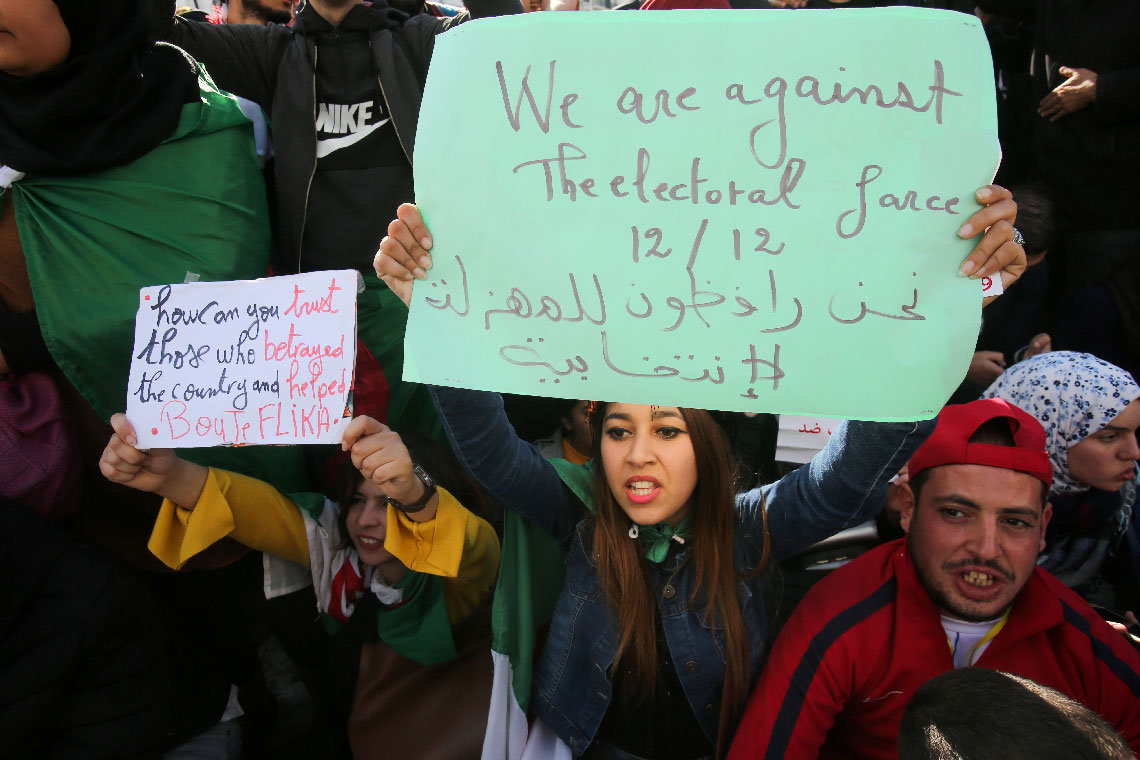Algeria holds elections as protesters boycott
ALGIERS - Thousands of people took to the streets in central Algiers on Thursday chanting "No vote! We want freedom!" as the authorities held a presidential election that a mass protest movement views as a charade intended to keep the ruling elite in power.
Police rushed the crowd with sticks to disperse the marchers, but then fell back as more protesters arrived.
Algeria on Thursday held the presidential vote after almost 10 months of political turmoil. All 61,000 polling stations around the North African country opened as planned at 8 am (0700 GMT), the official APS news agency reported.
Five candidates are in the running, all of them widely rejected as "children of the regime" of former president Abdelaziz Bouteflika, whom people power ousted in April after two decades in office.
Among them are former prime ministers Abdelmajid Tebboune, 73, and Ali Benflis, 75, and a former minister, Azzedine Mihoubi.
Turnout was expected to be extremely low after demonstrators shouting "no vote" again pressed their demand for a boycott on the eve of the polls, facing off with truncheon-wielding riot police in Algiers.
"How can we trust those who betrayed the country and helped Bouteflika?" read one placard at the rally, which saw scores arrested and many wounded in clashes with security forces.
Polls were scheduled to close at 1800 GMT but the result may not be announced until Friday, as it was after previous elections already marked by high abstention rates.
Whoever wins will struggle to be accepted by the electorate in the north African country, where many citizens rail against a military-backed regime they see as inept, corrupt and unable to manage the flagging economy.
"None of the five candidates can hope to be considered legitimate" in the eyes of the protesters, said Anthony Skinner, Middle East and North Africa director at risk analysis company Verisk Maplecroft.
He predicted that "the vote will be boycotted on a large scale".
'No to the system'
In an early indication of mass abstentions, polling stations at Algerian embassies abroad have stayed almost empty since they opened Saturday, with the few expatriates who did show up weathering insults by protesters.
While only a trickle of voters showed up in some Algerian districts, national television showed longer queues elsewhere, leading some online commentators to wonder "how much they have been paid".
Others suggested that Algerian soldiers dressed in civilian clothes had been sent to the polling stations by the army command, which is counting on a high turnout of voters to support its case that the elections are legitimate.
Two hours after the start of voting, turnout stood at 7.9 percent of the 24 million eligible voters, said the electoral authority - a "respectable" level according to its president Mohamed Charfi.
"I am voting because I am afraid that the country will get mired in the crisis," said Karim, a 28-year-old civil servant.
Mahdid Saadi, a 76-year-old retired man, showed off his voter card with many stamps and said: "I have always voted and I still vote today, it is a duty".
Other Algerians were of a different mind on Thursday - as the voting process got underway, protesters began to mobilise. Two polling stations were ransacked in the disaffected Kabylie region, home to much of Algeria's Berber ethnic minority, residents said.
They "ransacked the ballot boxes and destroyed part of the electoral lists" in the mountainous region's city of Bejaia, said one witness contacted by AFP from Algiers. Videos spread on social media showed protesters in Bejaia storming a voting station and tossing ballot papers into the air.
Elsewhere in Kabylie, a large crowd surrounded a polling station in the city of Tizi Ouzou, where all voting was suspended, and protesters also took to the streets of Bouira, witnesses said.
Protesters also took to the streets in the town of Haizer chanting "No vote".
Kabylie has a long history of opposition to the central government but Thursday's presidential vote was unpopular across much of the country.
The "Hirak" street movement kicked off when Bouteflika, 82, announced in February he would seek a fifth term in office.
Since then protesters have stayed on the streets for more than 40 weeks, demanding the total dismantling of the system that has ruled Algeria since independence from France in 1962.
'The Bouteflika system'
The military high command, which long wielded power from the shadows, has been forced to take a more visible role and has pushed for the election as a way to resolve the political crisis.
Demonstrators have also directed their ire at the powerful army chief Ahmed Gaid Salah, who has emerged as Algeria's de facto strongman.
A previous poll set for July was scrapped for lack of viable candidates and interim president Abdelkader Bensalah's term technically ended five months ago.
Given the broad opposition, the five candidates have run low-key campaigns, usually under heavy police protection and often being drowned out by hecklers. All of them in the past either supported Bouteflika or participated in his government.
This week saw Algerian courts hand down heavy jail sentences in high-profile corruption trials for two other former prime ministers, Ahmed Ouyahia and Abdelmalek Sellal.
But even those verdicts did little to win over the protesters, who see the trials as little more than a high-level purge in a struggle between still-powerful regime insiders.
Protests have been illegal in Algiers since 2001 and police have only tolerated weekly Hirak protests on Fridays and student marches on Tuesdays.
Wednesday marked the anniversary of the outbreak of major demonstrations against French colonial power in Algeria in 1960, and calls online urged protesters to converge on the Algiers square commemorating it.
Meriem, a 62-year-old Algiers resident, marched with her daughter and daughter-in-law brandishing red cards to oppose the election.
"I'm marching to say no to the vote," she said, "no to the Bouteflika system without Bouteflika."






